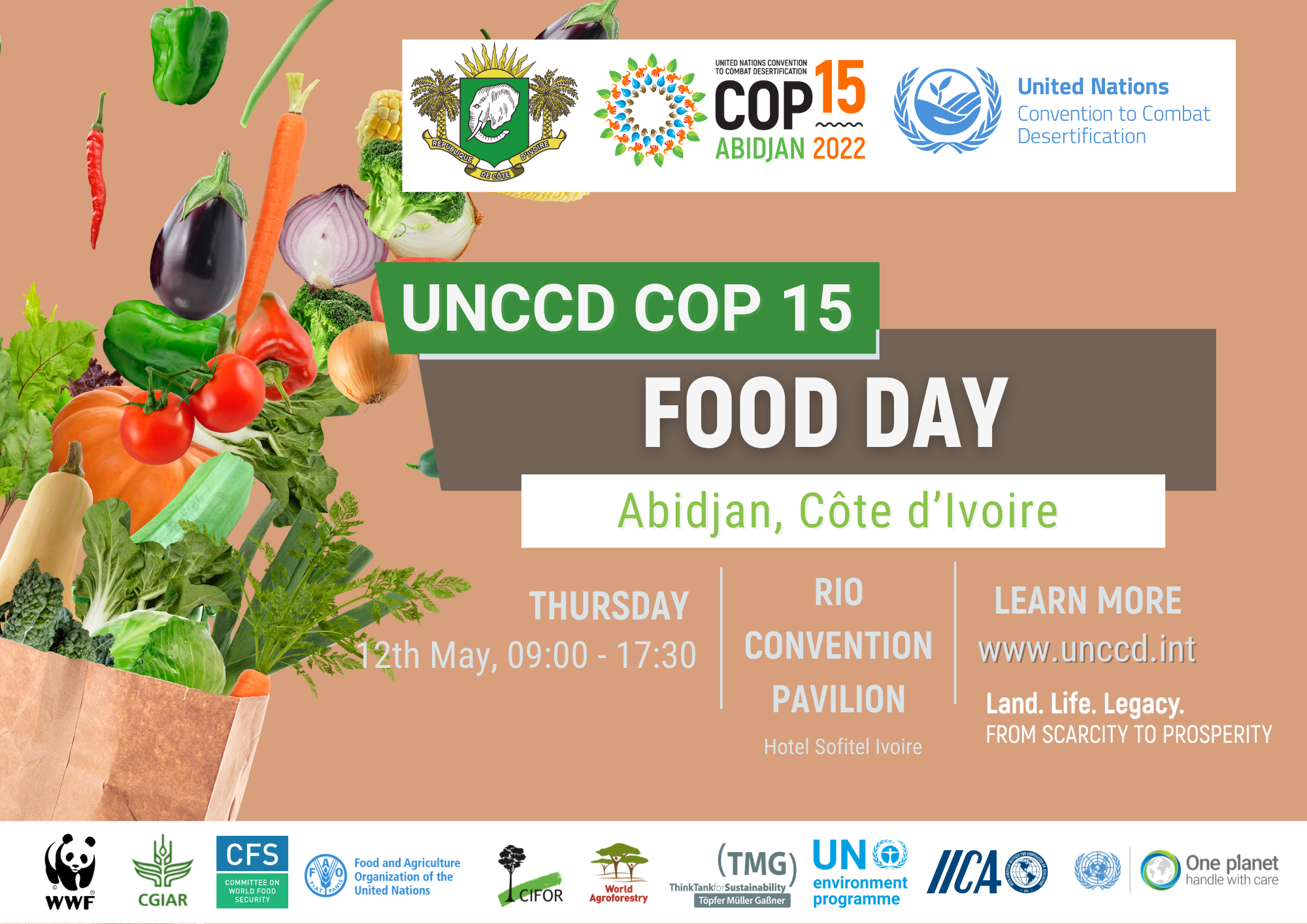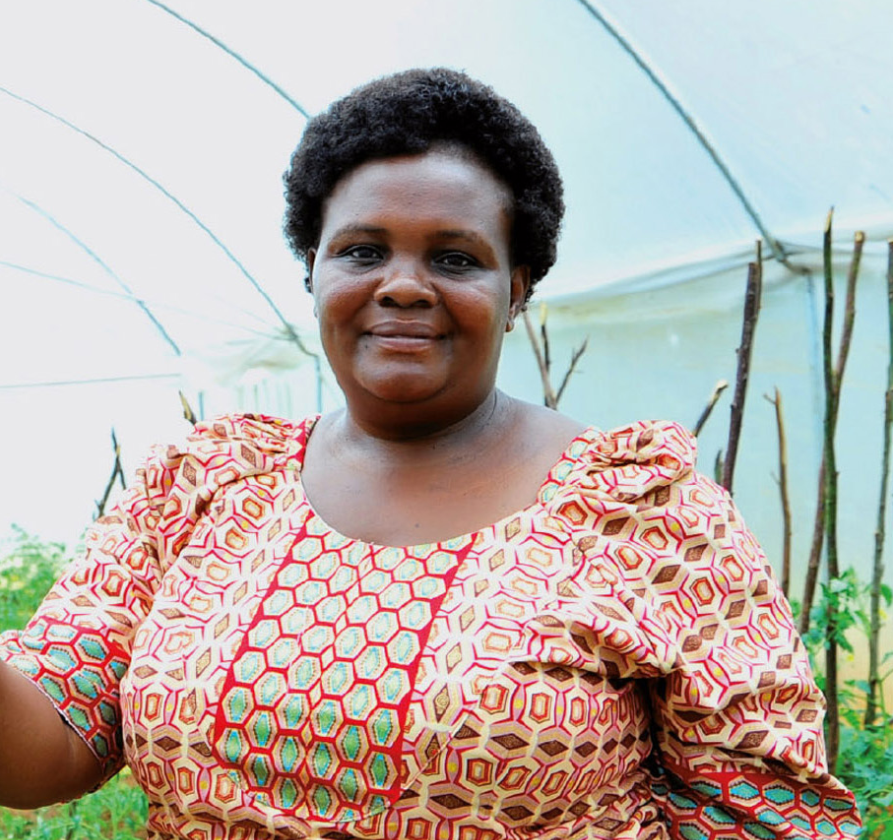Discussion
Food Day @ Rio Pavilion - Seeds of Change for a Nature Positive Future
Stressing the need to take a food systems approach for sustainable targets
Through this first Food Day @ UNCCD COP 15 we aim to call upon countries, private sector and other actors to take a food systems approaches in the LDN targets, the Nationally Determined Contribution (NDC) and the biodiversity targets. We will do so by leveraging three levers recommended in the report on LDN for Sustainable Agriculture and Food Security.
Cross-cutting policy responses spanning multiple global agreements By adopting a ‘food systems lens’, LDN response actions can further enhance the impact of existing policies and initiatives focused on environmental sustainability, inclusive economic growth, climate stability, and improved public health that are embedded in a range of key global agreements, most notably the SDGs and the Paris Agreement and the post 2020 Global Biodiversity Framework.
Interdependence of food system demand-side drivers and supply chains The interdependence of food system demand-side drivers and supply chains provides a singular focus for LDN response actions that simultaneously encourage the uptake of plant-based diets while at the same time reducing food loss and waste.
Capacity to deliver a coherent suite of on-the-ground actions (including finance) Nature-positive food policies that incentivize more sustainable practices and ensure supply chain transparency could help unlock the constraints in our current food systems. Developing the capacity to deliver a suite of coherent LDN response actions at the national level will necessarily include monitoring and evaluation protocols to guide future investment and including soil health.
TMG is organising the session My Land My Rights - Legitimate Tenure Rights for Food Security, Climate Resilience and Ecosystem Restoration, scheduled to take place at 10:00-11:00.
Secure tenure rights are a precondition for investments in land, soils, and the sustainable production of food. As underlined by the UNCCD in its recent land tenure decision (26/COP.14), responsible land governance is a fundamental component of sustainable land management and important to addressing desertification, land degradation and drought. Land governance is also key to adapt to climate change and create resilience among local communities.
UNCCD parties are encouraged to recognize legitimate tenure rights, including customary rights and invited to legally recognize equal use and ownership rights of land for women. The enhancement of women’s equal access to land and land tenure security as well as the promotion of gender-sensitive measures to combat desertification/land degradation and drought and achieve land degradation neutrality are also key issues for tackling food system challenges.
This session will highlight the interconnections between grassroots work to improve land governance and the opportunities and challenges on local, national and international levels to increase women's, Indigenous Peoples' and local communities' tenure security enabling sustainable food systems. This will contribute to informing future policy debates on the linkages between governance of tenure and Sustainable Food Systems from local to national and international level.
Many of today’s global challenges are related to food systems, particularly the way our land is used and managed to produce food. Mitigating and adapting to climate change, halting biodiversity loss, combating desertification and providing nutritious food, depend on restoring landscapes and maintaining soil health.
Land degradation and biodiversity loss are strongly related and are both the causes and consequences of a single environmental crisis affecting all life on land. Desertification and land degradation affect around three billion people worldwide. Science tells us that landscape restoration is a cost-effective way to combat climate change and biodiversity loss, while also increasing food and nutrition security. The estimated economic cost of biodiversity and ecosystem services lost because of land degradation is more than 10% of annual global gross product. By 2050, land degradation and climate change will reduce crop yields by an average of 10% globally, and up to 50% in certain regions.(IPBES;2019 and ) IPBES, 2018).
Over the past 200 years, soil organic carbon, an indicator of soil health, has dropped an estimated 8% globally (176 Gt C - equivalent to the carbon that would be lost from clearing an area of tropical forest approximately the size of Australia). Land degradation has reduced the productivity of 23% of the global land surface, up to US$577 billion in annual global crops are at risk from pollinator loss and 100-300 million people are at increased risk of floods and hurricanes because of loss of coastal habitats and protection.
Achieving the 1.5C degree target set in the Paris Agreement means taking an integrated “food systems approach” to reducing greenhouse gas emissions along the value chain, from the production, processing, to the consumption and disposal of food.
The theme for UNCCD COP-15 in 2022 is ‘Land. Life. Legacy: From scarcity to prosperity', with a call to action to ensure land, the lifeline on this planet, continues to benefit present and future generations. In 2015, the Sustainable Development Goal (SDG) target 15.3 was adopted which aims to combat desertification, restore degraded land and soil, including land affected by desertification, drought, and floods, and strives to achieve a land degradation neutral (LDN) world by 2030. LDN targets help countries to identify and adopt a broad range of measures to avoid, reduce or revert land degradation while improving gender equality and livelihoods.
The UN Food Systems Summit in 2021 reconfirmed that there is an urgent need to transform food systems at national and sub-national levels, and to reverse unsustainable consumption and production patterns along the entire value chain that cause the deterioration of the health of people and the planet. Food Systems approaches need to be integrated in all conventions: the UNCCD, UNCBD and UNFCCC.
The UNCCD Food Day will be the first Conference of the Parties with a full day on Food Systems Transformation.
Date
Time
11:00 - 19:30 (UTC+2)
Organisers
WWF
TMG Research
CGIAR
FAO
ICRAF-CIFOR
UNEP
IICA
CFS
Location
Abidjan, Côte d'Ivoire





